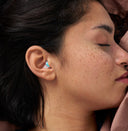Lights out, eyes closed and sleep. Well, if only it were that simple to get to sleep quickly and soundly. And even if you do fall asleep easily, you may wake up in the middle of the night or far too early. Fortunately, there's a lot you can do to get a good night's sleep. We've gathered the ten best sleep tips for you, from sleep routines to sleep earplugs!
10 sleep tips
Tip 1: Create a set bedtime routine
By doing the same things around the same time every night, you teach your body when it's time to 'switch off'. For example, start with a 'house check' in which you lock the door, tidy up a bit and turn off the light. Brush your teeth, wash your face and lay out your clothes ready for the morning. Follow this by reading for another 15 minutes and then -hopefully- you'll get a good night's sleep. You'll find that the longer you keep to the same bedtime routine, the easier it is to fall asleep
Tip 2: Reduce screen time in the evenings
Less screen time in the evening means a better night's rest. This is because the blue light from your screen(s) inhibits the formation of melatonin, the sleep hormone. In addition, smartphones and TV stimulate your brain because of all the images you see. Therefore, put away all screens at least an hour before going to sleep and trade your phone, laptop or tablet for a printed book or audiobook!
Tip 3: Let more fresh air into the bedroom
Did you know that we fall asleep the easiest and stay asleep at a bedroom temperature of about 18 degrees? It's also important to provide plenty of fresh air in your bedroom, otherwise it will be stuffy and you may wake up groggy and tired. Therefore, always leave the window slightly open, even in winter. What can also help are air-purifying houseplants; some varieties are known to release oxygen at night.
Tip 4: Use earplugs in a noisy room or if your partner snores
Noise is one of the biggest sources of disturbance; a snoring partner, neighbours having a party or noise on the street can keep you from sleeping. Fortunately, the solution is simple: Sleep earplugs! For example, the Alpine SleepDeep earplugs provide maximum attenuation, so your night's sleep won't be disturbed by background noises.
Did you know that 100% noise-cancelling earplugs are a myth? In fact, sound reaches your eardrum in several ways. You can read more about this in our blog post Are there soundproof earplugs for complete silence?
Tip 5: Ensure regularity
There was a good reason for you always having to go to bed at a set time when you were little. In addition to a set bedtime routine, it also helps to maintain a regular sleep rhythm. Go to bed around the same time every night and get up around the same time. For example, put in sleep earplugs at 11 pm, turn off the lights and set the alarm for 7 am. Even at the weekends!
Tip 6: Make it a sport
Those who exercise enough during the day fall asleep more easily at night. Exercise doesn't necessarily have to be in the gym, an intense crossfit session or a heavy HIIT exercise class. A half-hour walk or bike ride also counts and helps you to relax. For example, go outside for a walk every evening after dinner. Keep in mind that exercising intensely later in the evening can actually backfire. If you are still full of adrenaline after a kickboxing class, it will take some time for your nervous system to calm down enough for you to fall asleep!
Tip 7: Try an eye mask
Is light rather than noise the reason behind your lack of sleep? Hang blackout curtains or use a sleep mask for extra darkness. Once it gets dark, your body starts producing melatonin; the sleep hormone that makes you sleepy. When exposed to light, melatonin production is inhibited and so you wake up earlier. Especially in summer, when the sun rises early, it's nice if it doesn't wake you up at 5:00 am.
Tip 8: Get out of bed for a while if you can't fall asleep
We've all experienced it from time to time: you lie in bed and just can't fall asleep. You keep tossing and turning and fretting, which, of course, is a nightmare for your night's rest. Did you know that you can often fall asleep more easily after getting out of bed for a while? Make sure, thought, that you are doing something that helps you relax. For example, listening to quiet music or reading a book on the sofa. You ll find that drowsiness comes naturally - after which you can creep back into your bed.
Tip 9: Watch your food and drink
Getting into bed immediately after eating is not recommended. Your body needs time to digest food and is mostly busy doing that instead of falling asleep. Avoid eating heavy meals for at least two hours before you go to bed. Caffeine and alcohol later in the evening do not contribute to a good night's sleep either.
Tip 10: Discover what helps you relax
Whereas some find relaxation in reading a thriller, for others this is counterproductive. Therefore, it's important to distinguish between stress and relaxation. You'll notice soon enough what makes you sleepy; taking a bath, turning on a podcast, rubbing your feet with cream... Work out what your 'sleep triggers' are at night!
Need help getting a better night's sleep?
A good night's sleep is a very personal thing, and there's no single solution that will ensure you'll fall asleep and stay soundly asleep. Fortunately, the above tips can help you figure out what your personal 'sleep recipe' is. In addition, it's definitely recommended to use good sleep earplugs. In addition to the Alpine SleepDeep earplugs we mentioned earlier, you can also opt for the Alpine SleepSoft earplugs. Alpine SoftSilicone earplugs are great if, for example, you have trouble falling or staying asleep when you are somewhere else. Alpine Silence earplugs are ideal not only for sleeping but also for focus while studying or working. Try it out - with the right sleep earplugs, you'll be in dreamland before you know it!


